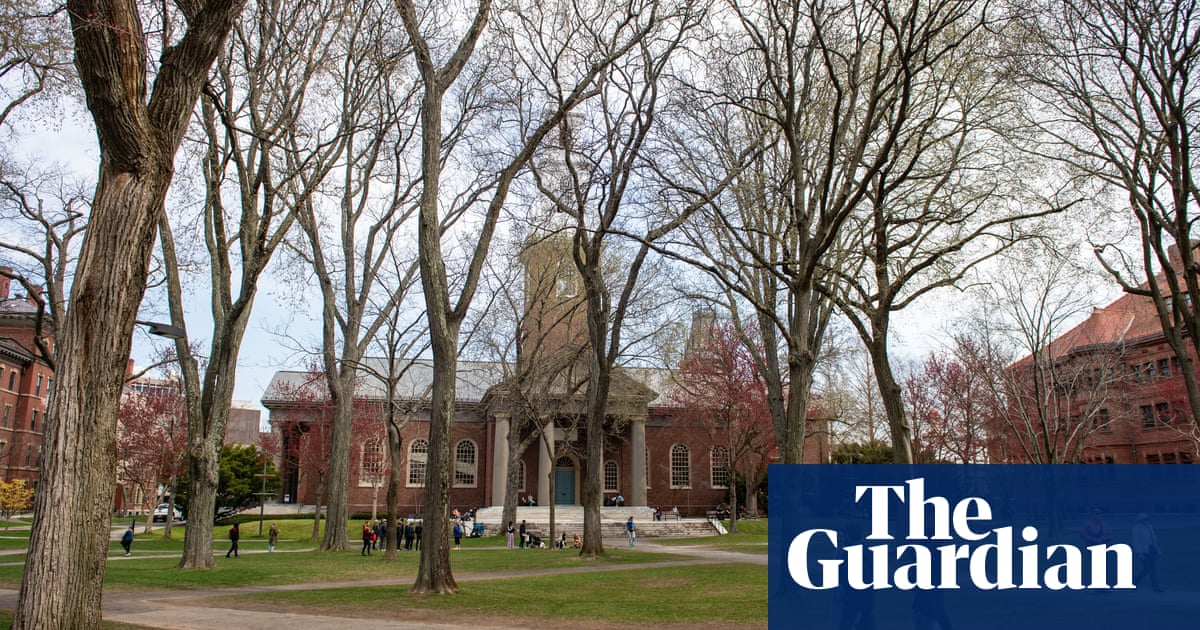It might come to be seen as the moment the “woke liberal empire” of Donald Trump’s most fevered imaginings struck back.
Harvard University, the world-renowned institution emblematic of the elitism that Trump and his coterie hold in contempt, received a extortive demand from the administration that it surrender the core of its academic freedoms – and promptly told it to get lost.
That, in shorthand, is a summary of the exchange of letters between three Trump officials and Harvard’s president, Alan Garber, that may in time be seen as something of a turning point in relations between the administration and academia.
Echoing pressures imposed on other elite colleges, notably Columbia University, the Trump team – representing the departments of education and health, and the general services administration – had demanded sweeping reforms in how Harvard is run, including the installation of viewpoint-diverse faculty members and the end of diversity, equity and inclusion (DEI) programmes.
The backdrop to a demand for what would be unprecedented government interference in the affairs of the world’s richest university is the alleged rise of campus antisemitism, arising from an upsurge of pro-Palestinian demonstrations that have gripped Harvard and other colleges following Hamas’s 7 October 2023 attack on Israel and Israel’s retaliatory military offensive in Gaza.
Critics, however, see a more nefarious White House agenda – namely, gutting universities of what it sees as a liberal-left bias, while using antisemitism as a cudgel in an authoritarian power grab.
Having seen Columbia cave in to similar demands and threatening $9bn in federal funding, the White House may have thought it was on to a winner with Harvard.
“Investment is not an entitlement,” the administration’s 11 April letter read, accusing Harvard of having “failed to live up to both the intellectual and civil rights conditions that justify federal investment”.
The missive then set out a detailed list of 10 conditions that Harvard needed to satisfy in order to received continued funding.
Bolstered by a financial endowment that reached $53.2m in 2024 and which might cushion the blow of federal cuts, Garber called the White House’s bluff.
He did so in terms clearly expressing his belief that the government’s stated goals of stamping out antisemitism – an issue Harvard had already taken steps to address, including, controversially, by adopting the International Holocaust Remembrance Alliance definition of the prejudice – masked more insidious aims.
The administration’s demands made “clear that the intention is not to work with us to address antisemitism in a cooperative and constructive manner”, Garber wrote.
“Although some of the demands outlined by the government are aimed at combating antisemitism, the majority represent direct governmental regulation of the ‘intellectual conditions’ at Harvard.
“No government – regardless of which party is in power – should dictate what private universities can teach, whom they can admit and hire, and which areas of study and inquiry they can pursue.”
The university’s lawyers, Michael Burck and Robert Hur, both of whom have conservative credentials, starkly set out the broader constitutional stakes, writing that the government’s demands were “in contravention of the first amendment” and concluding that “Harvard is not prepared to agree to demands that go beyond the lawful authority of this or any administration”.
Within hours of Harvard’s rebuff, the administration retaliated by freezing $2.2bn in grants along with a $60m contract.
It seemed somehow fitting that Harvard’s stand was being made on the same day that the Trump administration was openly defying a supreme court ruling to return a wrongfully deported Salvadoran man, Kilmar Abrego García, and El Salvador’s president, Nayib Bukele, was visiting the White House.
That posture appeared to put the onus on the supreme court to take a more forceful stand against the White House’s defiance.
Now, thanks to Harvard’s stance, some establishment figures hope the court may just find the spine to do so.
Michael Luttig, a conservative-leaning former federal appeals court judge who has previously accused the administration of “declaring war on the rule of law”, said Harvard’s pushback had “momentous significance”.
“This should be the turning point in the president’s rampage against American institutions,” he told the New York Times.
Other universities, faced with similar demands to capitulate, now have a stronger impetus to fight back, said Ted Mitchell, president of the American Council on Education, although most others lack Harvard’s financial reserves. “If Harvard had not taken this stand, it would have been nearly impossible for other institutions to do so,” he said.
It may also provide inspiration for law firms – several of whom have already agreed to demands that they provide pro bono services to Trump as he seeks retribution against those who have represented his adversaries – to stand firm in the face of future intimidation.
Stephen Miller, the White House deputy chief of staff and head of policy, is said to have wanted a fight with Harvard, believing it essential to break a liberal hold on higher education.
But if the university’s response serves as an example to others, the battle may turn into a wider front than he envisioned.



